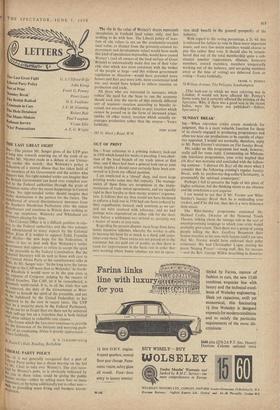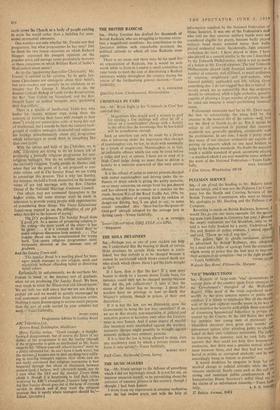'SUNDAY BREAK'
SIR,—When television critics create standards for judgment, this is a most valuable function for those of us closely engaged in producing programmes and often too near our productions to be capable of objec- tive appraisal. I would not normally, therefore, reply to Mr. Peter Forster's strictures on The Sunday Break.
His asides on this programme last week, however, really call for some reply. Commenting on Whitsun- tide television programmes, your critic implied that Olt Boy! was moronic and concluded with the follow- ing sentence : 1 distrust Oh Boy! all the more when I consider that the following evening's regular Sunday Break, with its pardon-my-dog-collar-Christianity, is presumably the spiritual counterpart.'
Perhaps I fail to perceive the logic of this piece of higher criticism, but the thinking seems to mc obscure and the conclusion a non sequitur.
I am bound to say that if Mr. Forster saw Whit- Sunday's Sunday Break then he is misleading your readers, and if he did not, then this is a very dishonest little smear.
The Whit-Sunday programme contained Mr. Michael Crofts, Director of the National Youth Theatre, talking about the teenage cult in the sort of uncompromising language to which your critic itould probably give assent. Then there was a group of young people telling the Rev. Geoffrey Beaumont their honest reaction to his new-style hymns (and I am sure that Mr. Forster would have endorsed their pithy criticisms). We had Christopher Logue reciting his poem 'Singing Prayer'—strong stuff, this, for morons —and the Ray. George Wilkie describing in down-to-
earth terms the Church as n body of people existing to serve the world rather than a building for occa- sional ceremonial entrances.
One wonders not only whether Mr. Forster saw that progriuume, but what programmes he has seen? Did he think:the two recent occasions on which Richard Hoggart expressed his pungent opinions on the popular press and teenage tastes particularly moronic or those occasions.on which William Reed of Sadler's Welist:liked about music?
As: to the 'patdon-my-dog,collar-Christianity' Mr. Forster is entitled to his opinion. To be quite fair, some CPurehmen are apologetic about their beliefs. but yourAcaders can scarcely he so credulous as to imagine that Dr. George F. Macleod on sin, the Roman Catholic Bishop of Leeds on' the Resurrection. the Rev. Tom Colvin. on Nyasaland, and the Rev. Donald 'Soper on nuclear weapons, were 'pardoning their dog-collars.'
There is a species of intellectual Teddy-boy who knifes his victims without even, doing them the courtesy of knowing their faces well enough to hate them] would not accuselsiur critic of being this sort of intellectual', blit I assume he finds the cultural back- , ground of modern teenagers distasteful and expresses his fecliags indiscriminately about any ..programme which endeaVours to reach them in something like their own teririS
With the advice and help of the_Churches, wc in ABC Television. are trying to do an honest job of pia:lancing a:basically religious programme for non- religious'teetiagerS.. Nor dO we confine .ourselves to the tiarrowiY religious. Young people do discuss, and, when they see the point of it, arc prepared to con- sider values, and in The Sunday Break we are trying to encourage this process. That is why last Sunda', for instance; we held a frank discussion on the teenage views of sex and marriage with the Rev. Charles DaVeY of the National Marriage Guidance Council.
Our efforts may not commend themselves to the higher critics, but some attempt Must be made in television to provide young people with opportunities of :considering these things. The Times. Educational Supplement seemed la see the.difficulties.of our job when theiklid us the honour of saying: , The,ITV programme The Sunday' Break dOeti :ti'gcuid. job. As a means of presenting religiog to .:the yOling—the mass youth of the cities—it has iti .point's . . it is *a triumph in these days' to' make religious discussion look natural: . .• . The SundaY Break can be complimented for trying hard. Too many religious programmes seem tortuously. 'directed at the intenser sort • of graduate. . , And the Sanday.Times said: The Sunday Break 'is a meeting place for teen- agers which manages to mix religion, work and relaxation, without offending belief or distorting social values.
tortunitelY. bi• unfortunately, we do not have Mr. Forster in mind, or the intenser sort of graduate, when we are producing The Sunday Break. We have very much in mind the fifteen-year-old iichool-leaver.' We are only too well' aware that 'we are not doing a. perfect job and we would be greatly encouraggd by real assessment and criticism from television critics. Nothing is mbre discouraging to serious social purpose than the sort of aside carried by your columns last
FENRY JONES
• Programme Adviser to Sunday Break ABC Television Ltd., Broom Road, Teddington, Middlesex • [Peter Forster writes: "Good enough: a straight- forward disagreement, but of course the heart of my dislike of the programme Is not the matter (though if the programme is quite as intellectual as Mr. Jones suggests' his "fifteen-year-old school-leavers" must be a pretty advanced lot : he can't have it both ways), but the mannert,I happen not to find anytbingsvery ;edify- ing in hearing teenagers express their views and am not really convinced that religious instruction is best imparted through this idiom of discussion between earnest (and, I believe, well rehearsed) youth, nor do I care what the TES and the Sunday Times think about it. though it is heartening to find their critics won•over by ABC's evangelism.,1 'cannot help reflect- ing that Sunday Break goes Out at the hour of evening service in church and if they want the religious message that is surely where teenagers should be.'— Editor. Spectator.)







































 Previous page
Previous page